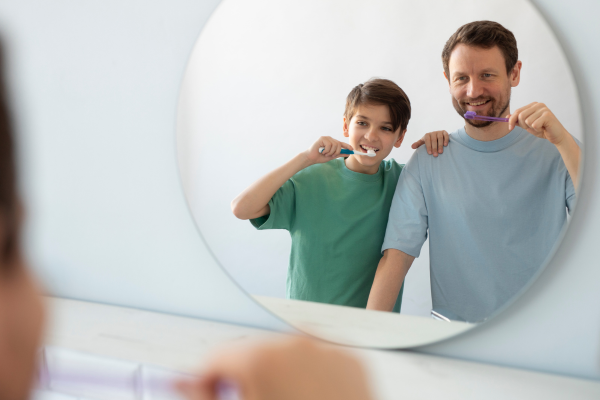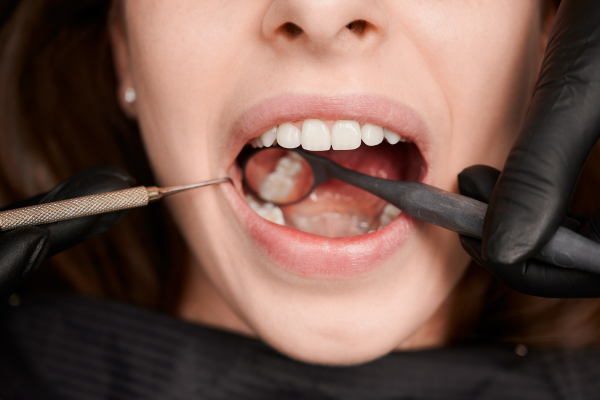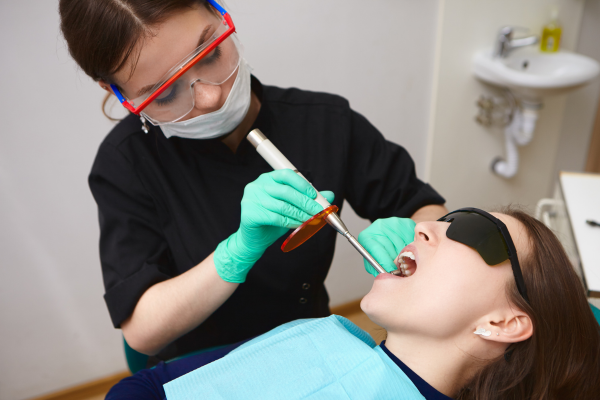Establishing a proper oral care routine from a young age isn’t just about maintaining a bright smile in childhood—it lays the groundwork for healthy, strong permanent teeth that can last a lifetime. Many parents underestimate the importance of primary (baby) teeth, assuming they’re only temporary and thus less important. In reality, these early teeth play a vital role in speech development, proper chewing, and serving as placeholders for adult teeth. Without adequate care, children can face tooth decay, gum issues, and even long-term dental complications.
When good oral hygiene becomes part of a child’s daily routine early on, it becomes second nature. From choosing the right toothbrush to teaching effective brushing techniques, every small step helps shape lifelong habits. This blog explores why early dental care is essential and how you can support your child in developing strong, healthy teeth for life.
How Does Oral Hygiene Impact Permanent Tooth Development?
Tooth development begins long before a child’s first tooth erupts. In fact, permanent teeth start forming underneath the baby teeth during infancy. If the baby teeth become infected or are lost prematurely due to poor oral hygiene, the positioning and health of the developing permanent teeth may be compromised.
Key impacts of poor hygiene on permanent teeth include:
- Misalignment due to early loss of baby teeth
- Increased risk of decay in emerging permanent teeth
- Higher chances of gum infections and weakened enamel
- Poor oral habits extending into adolescence and adulthood
Establishing oral hygiene early supports a healthier oral environment, allowing permanent teeth to erupt into a clean, properly aligned space.
What Should a Proper Oral Care Routine for Children Include?
Building an effective oral care routine involves more than just brushing. Parents should support children through various age-appropriate habits that protect both gums and teeth.
Step-by-step daily oral hygiene for children:
- Begin cleaning your baby’s gums with a damp cloth before teeth appear
- Start brushing as soon as the first tooth erupts
- Use a child-sized toothbrush with soft bristles
- Apply a smear of fluoride toothpaste for children under three
- Use a pea-sized amount of fluoride toothpaste from ages three to six
- Brush twice daily, especially after the last meal of the day
- Introduce flossing when teeth start to touch
- Make brushing a supervised activity until at least age seven
- Avoid letting children sleep with a bottle or snack
- Encourage rinsing with water after sugary foods
What Role Do Parents Play in Building These Habits?
Children model behaviour. If they see parents brushing and flossing regularly, they’re far more likely to adopt those practices themselves. Parental involvement should continue even as children become more independent. Until your child can tie their shoelaces properly, it’s generally best to supervise or assist with brushing and flossing.
To reinforce habits:
- Make brushing a family activity
- Use timers or brushing songs to make the process fun
- Offer positive reinforcement like stickers or a brushing chart
- Choose colourful or themed toothbrushes to engage interest
What Are the Key Milestones in Children’s Oral Development?
Understanding oral care milestones can help you tailor care to your child’s age and needs. Use the following table to guide you:
| Age Range | Oral Care Milestones | Tips for Parents |
| 0–12 months | Gums need wiping, first tooth erupts | Use a clean cloth or silicone finger brush |
| 1–3 years | Multiple baby teeth erupt | Introduce small toothbrush, brush twice daily |
| 4–6 years | Learns to spit and brush with guidance | Supervise brushing, use pea-sized fluoride toothpaste |
| 7–9 years | First permanent molars emerge | Encourage independence but monitor technique |
| 10–12 years | Pre-teens develop more adult teeth | Emphasise flossing, maintain regular check-ups |
What Are the Long-Term Benefits of Early Oral Care?
Creating a positive oral care routine early in life contributes to:
- Lower risk of dental decay and cavities
- Healthier gums and bone structure
- Reduced need for complex dental treatments in future
- Stronger enamel in permanent teeth
- Positive associations with dental visits
- Better nutrition due to pain-free chewing
- Clear speech development and improved self-esteem
What Foods Support Strong Permanent Teeth?
In addition to daily brushing and flossing, diet plays a significant role in supporting children’s oral health.
To include:
- Dairy products like cheese and yoghurt
- Crunchy vegetables such as carrots and celery
- Nuts and seeds (for older children)
- Whole grains and lean proteins
- Water as the main drink between meals
To limit:
- Sugary snacks and soft drinks
- Fruit juices with added sugar
- Sticky sweets like toffees or lollies
- Frequent snacking between meals
When Should Children Visit the Dentist?
The first dental clinic Terrigal visit is recommended by the time your child turns one, or within six months of the first tooth erupting. Regular dental check-ups every 6 to 12 months help detect early signs of decay or misalignment.
Benefits of early visits include:
- Desensitising the child to the dental environment
- Early intervention for thumb sucking or pacifier use
- Monitoring eruption patterns and jaw development
- Guidance on brushing techniques and fluoride use
Why Choose Terrigal Beach Dental + Implant Centre for Your Child’s Oral Health?
At Terrigal Beach Dental + Implant Centre, we’re passionate about making oral care enjoyable and stress-free for young patients. Our team prioritises education, prevention, and gentle treatment to build lifelong positive dental habits. We welcome children of all ages and tailor each visit to their developmental stage—ensuring that your child leaves with a smile and the knowledge to maintain it.
From your child’s first visit to their teenage years, our experienced clinicians will guide you through every milestone. With our family-focused approach, calming environment, and state-of-the-art equipment, Terrigal Beach Dental + Implant Centre is your trusted partner in raising healthy, confident smiles.
References
- Australian Dental Association. Oral Health for Children
- Raising Children Network. Teeth development in children
- Better Health Channel Victoria. Dental care for children
Frequently Asked Questions
1. When should I start brushing my child’s teeth?
You should begin cleaning your child’s gums with a damp cloth before teeth appear. Start brushing with a soft-bristled toothbrush as soon as the first tooth erupts.
2. What toothpaste should my child use?
Children under three should use a smear of low-fluoride toothpaste. From ages three to six, a pea-sized amount of fluoride toothpaste is recommended.
3. Do baby teeth really matter if they fall out anyway?
Yes. Healthy baby teeth maintain space for permanent teeth and support speech and chewing. Early loss can lead to alignment issues.
4. How often should my child visit the dentist?
Regular dental visits every 6 to 12 months are ideal, starting by age one or when the first tooth appears.
5. What’s the best way to make brushing fun?
Use a colourful toothbrush, play songs or use brushing apps with timers. Turning it into a game can help maintain consistency.
6. Is it normal for children to have crooked teeth?
It can be common, especially as permanent teeth emerge. A dentist will monitor jaw and tooth alignment and advise if orthodontic intervention is needed.






